Unit 11 Research Project: Female Leadership Challenges in Hospitality
VerifiedAdded on 2023/01/12
|15
|3852
|74
Project
AI Summary
This research project investigates the barriers faced by female leaders in the hospitality sector, specifically within Marriott hotels, concerning gender equality in leadership and management. The research aims to understand the concept of equal gender roles, identify discrimination against female leaders, assess organizational strategies for maintaining gender equality, and provide recommendations for Marriott hotels to improve gender equality. The project employs a qualitative research method, utilizing questionnaires and interpretivism to gather and analyze data from internal sources, including Marriott hotel employees and female leaders. Key literature sources are used to support the research, focusing on topics such as gender equality, diversity, and leadership challenges. The research also includes a timeline of activities, detailing the various stages of the project from aim formulation to final submission, and adopts random sampling to collect data efficiently. Ultimately, the project seeks to provide actionable insights for promoting gender equality in leadership roles within the hospitality industry.
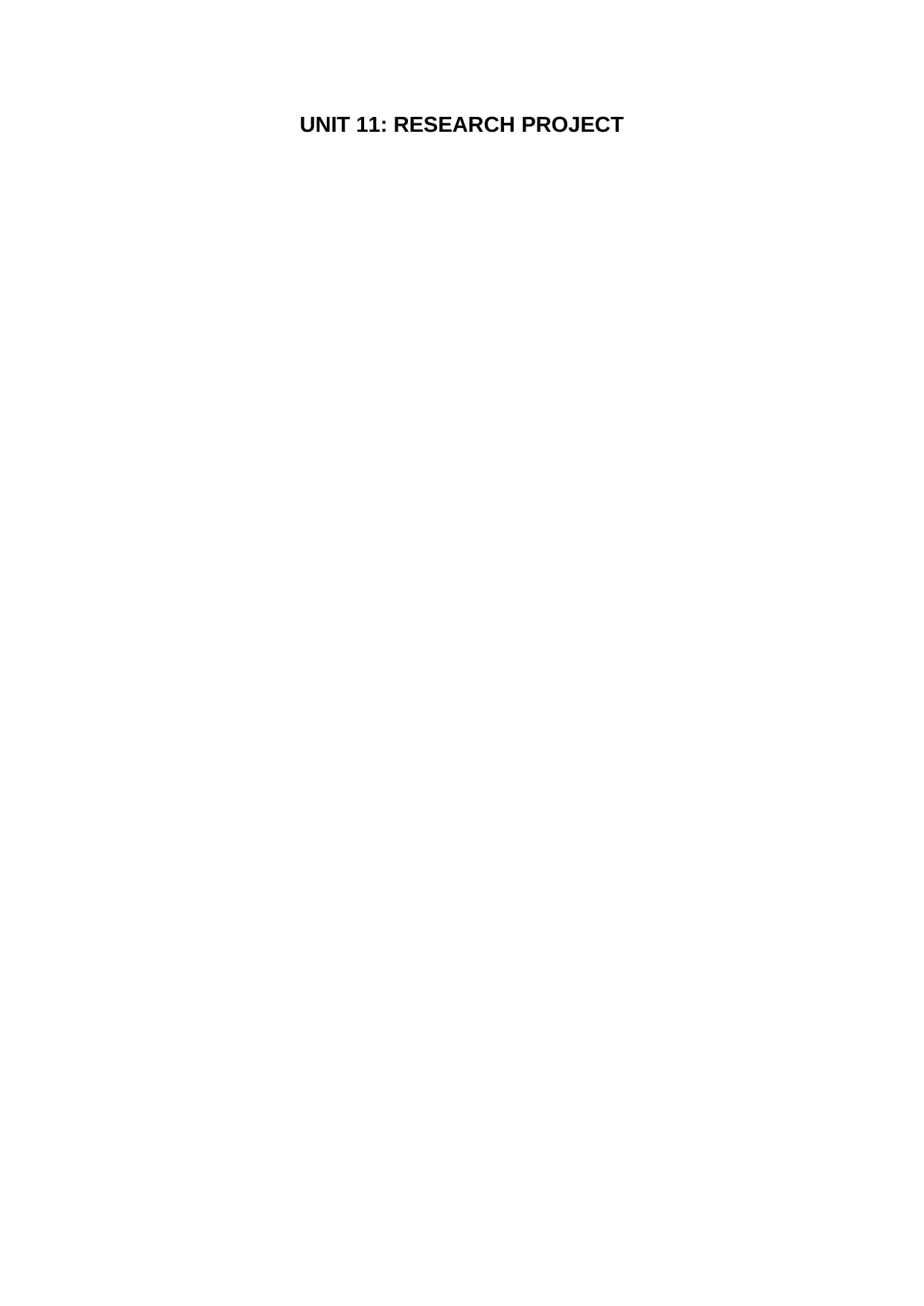
UNIT 11: RESEARCH PROJECT
Paraphrase This Document
Need a fresh take? Get an instant paraphrase of this document with our AI Paraphraser
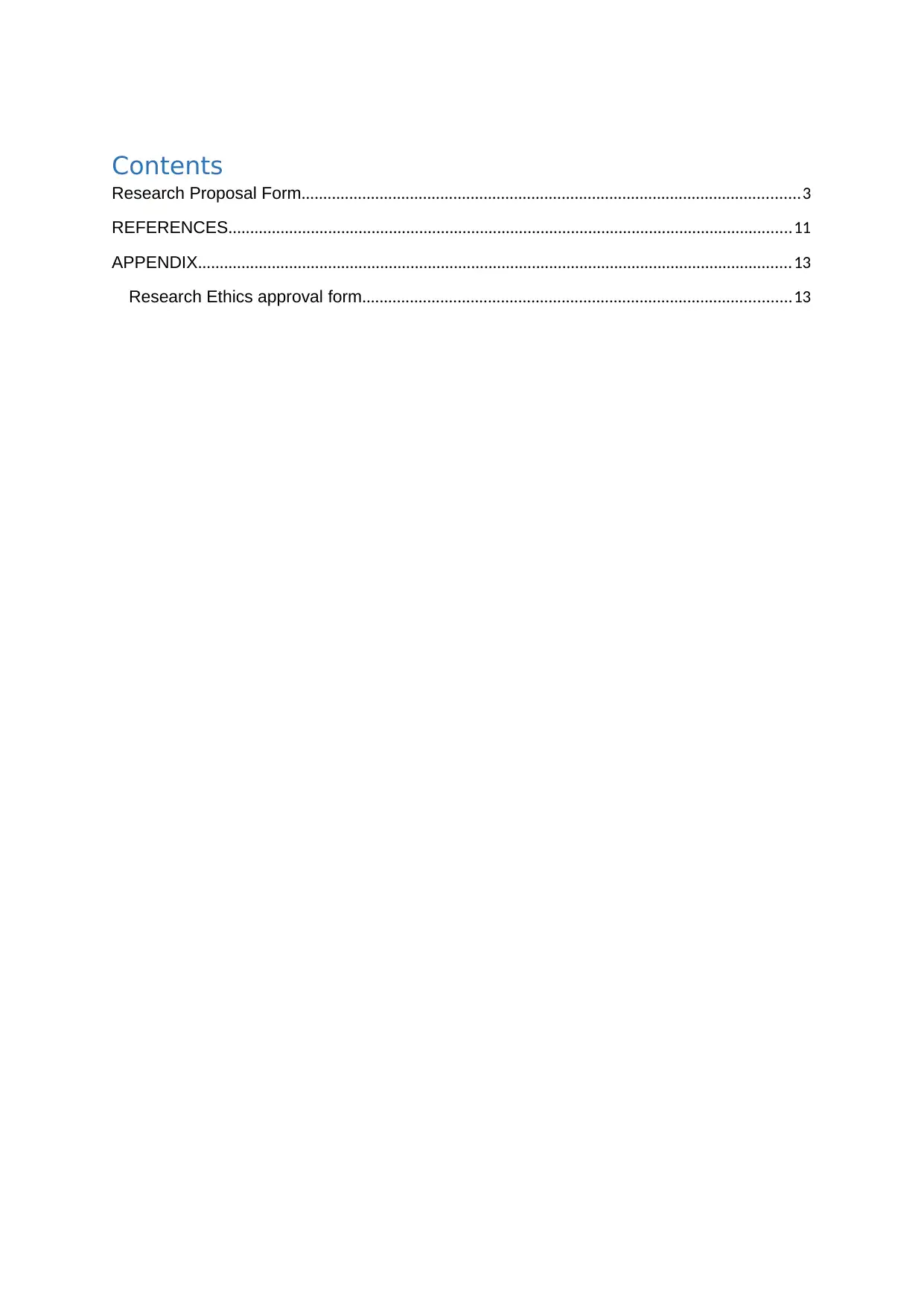
Contents
Research Proposal Form...................................................................................................................3
REFERENCES..................................................................................................................................11
APPENDIX.........................................................................................................................................13
Research Ethics approval form...................................................................................................13
Research Proposal Form...................................................................................................................3
REFERENCES..................................................................................................................................11
APPENDIX.........................................................................................................................................13
Research Ethics approval form...................................................................................................13
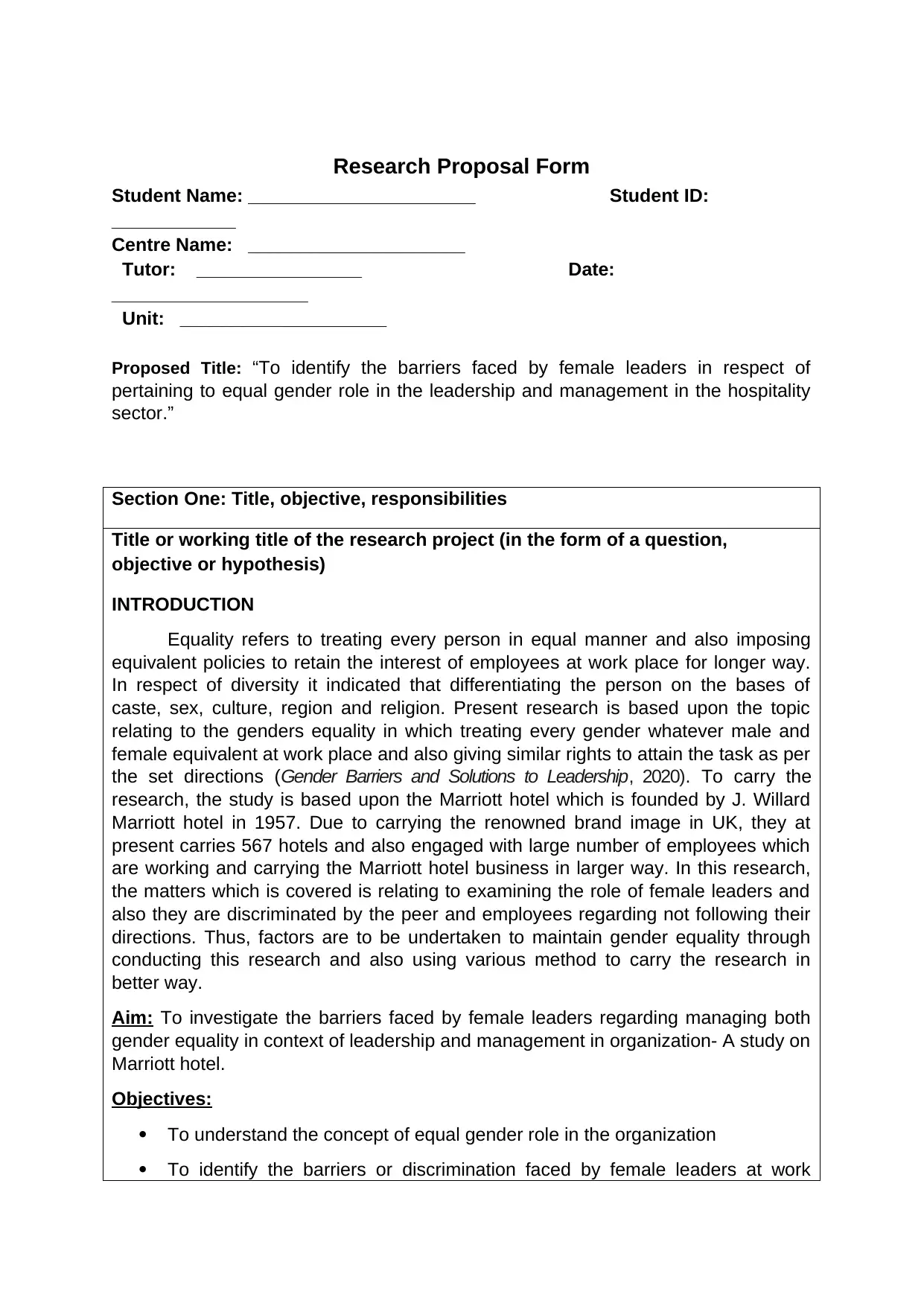
Research Proposal Form
Student Name: ______________________ Student ID:
____________
Centre Name: _____________________
Tutor: ________________ Date:
___________________
Unit: ____________________
Proposed Title: “To identify the barriers faced by female leaders in respect of
pertaining to equal gender role in the leadership and management in the hospitality
sector.”
Section One: Title, objective, responsibilities
Title or working title of the research project (in the form of a question,
objective or hypothesis)
INTRODUCTION
Equality refers to treating every person in equal manner and also imposing
equivalent policies to retain the interest of employees at work place for longer way.
In respect of diversity it indicated that differentiating the person on the bases of
caste, sex, culture, region and religion. Present research is based upon the topic
relating to the genders equality in which treating every gender whatever male and
female equivalent at work place and also giving similar rights to attain the task as per
the set directions (Gender Barriers and Solutions to Leadership, 2020). To carry the
research, the study is based upon the Marriott hotel which is founded by J. Willard
Marriott hotel in 1957. Due to carrying the renowned brand image in UK, they at
present carries 567 hotels and also engaged with large number of employees which
are working and carrying the Marriott hotel business in larger way. In this research,
the matters which is covered is relating to examining the role of female leaders and
also they are discriminated by the peer and employees regarding not following their
directions. Thus, factors are to be undertaken to maintain gender equality through
conducting this research and also using various method to carry the research in
better way.
Aim: To investigate the barriers faced by female leaders regarding managing both
gender equality in context of leadership and management in organization- A study on
Marriott hotel.
Objectives:
To understand the concept of equal gender role in the organization
To identify the barriers or discrimination faced by female leaders at work
Student Name: ______________________ Student ID:
____________
Centre Name: _____________________
Tutor: ________________ Date:
___________________
Unit: ____________________
Proposed Title: “To identify the barriers faced by female leaders in respect of
pertaining to equal gender role in the leadership and management in the hospitality
sector.”
Section One: Title, objective, responsibilities
Title or working title of the research project (in the form of a question,
objective or hypothesis)
INTRODUCTION
Equality refers to treating every person in equal manner and also imposing
equivalent policies to retain the interest of employees at work place for longer way.
In respect of diversity it indicated that differentiating the person on the bases of
caste, sex, culture, region and religion. Present research is based upon the topic
relating to the genders equality in which treating every gender whatever male and
female equivalent at work place and also giving similar rights to attain the task as per
the set directions (Gender Barriers and Solutions to Leadership, 2020). To carry the
research, the study is based upon the Marriott hotel which is founded by J. Willard
Marriott hotel in 1957. Due to carrying the renowned brand image in UK, they at
present carries 567 hotels and also engaged with large number of employees which
are working and carrying the Marriott hotel business in larger way. In this research,
the matters which is covered is relating to examining the role of female leaders and
also they are discriminated by the peer and employees regarding not following their
directions. Thus, factors are to be undertaken to maintain gender equality through
conducting this research and also using various method to carry the research in
better way.
Aim: To investigate the barriers faced by female leaders regarding managing both
gender equality in context of leadership and management in organization- A study on
Marriott hotel.
Objectives:
To understand the concept of equal gender role in the organization
To identify the barriers or discrimination faced by female leaders at work
⊘ This is a preview!⊘
Do you want full access?
Subscribe today to unlock all pages.

Trusted by 1+ million students worldwide
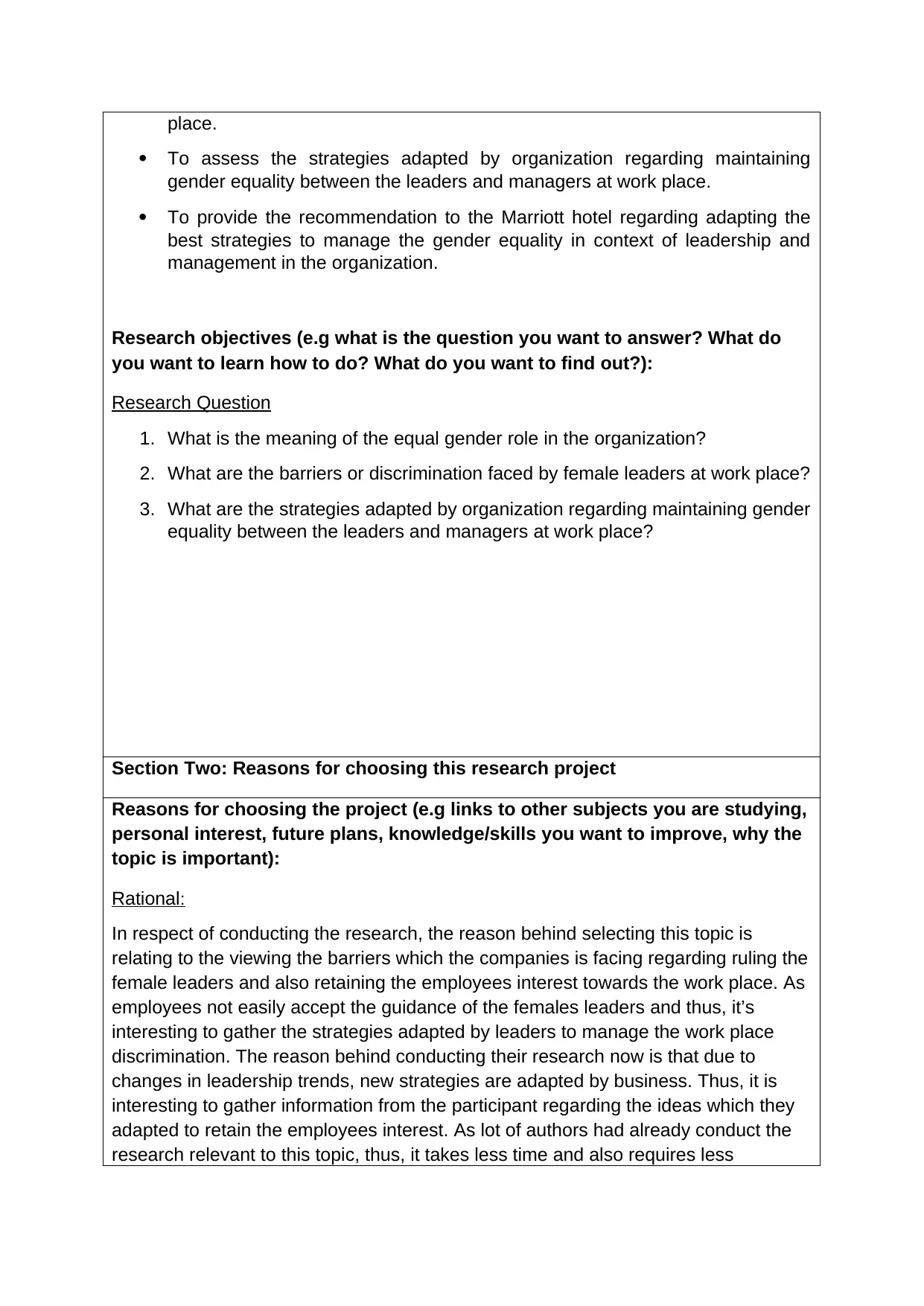
place.
To assess the strategies adapted by organization regarding maintaining
gender equality between the leaders and managers at work place.
To provide the recommendation to the Marriott hotel regarding adapting the
best strategies to manage the gender equality in context of leadership and
management in the organization.
Research objectives (e.g what is the question you want to answer? What do
you want to learn how to do? What do you want to find out?):
Research Question
1. What is the meaning of the equal gender role in the organization?
2. What are the barriers or discrimination faced by female leaders at work place?
3. What are the strategies adapted by organization regarding maintaining gender
equality between the leaders and managers at work place?
Section Two: Reasons for choosing this research project
Reasons for choosing the project (e.g links to other subjects you are studying,
personal interest, future plans, knowledge/skills you want to improve, why the
topic is important):
Rational:
In respect of conducting the research, the reason behind selecting this topic is
relating to the viewing the barriers which the companies is facing regarding ruling the
female leaders and also retaining the employees interest towards the work place. As
employees not easily accept the guidance of the females leaders and thus, it’s
interesting to gather the strategies adapted by leaders to manage the work place
discrimination. The reason behind conducting their research now is that due to
changes in leadership trends, new strategies are adapted by business. Thus, it is
interesting to gather information from the participant regarding the ideas which they
adapted to retain the employees interest. As lot of authors had already conduct the
research relevant to this topic, thus, it takes less time and also requires less
To assess the strategies adapted by organization regarding maintaining
gender equality between the leaders and managers at work place.
To provide the recommendation to the Marriott hotel regarding adapting the
best strategies to manage the gender equality in context of leadership and
management in the organization.
Research objectives (e.g what is the question you want to answer? What do
you want to learn how to do? What do you want to find out?):
Research Question
1. What is the meaning of the equal gender role in the organization?
2. What are the barriers or discrimination faced by female leaders at work place?
3. What are the strategies adapted by organization regarding maintaining gender
equality between the leaders and managers at work place?
Section Two: Reasons for choosing this research project
Reasons for choosing the project (e.g links to other subjects you are studying,
personal interest, future plans, knowledge/skills you want to improve, why the
topic is important):
Rational:
In respect of conducting the research, the reason behind selecting this topic is
relating to the viewing the barriers which the companies is facing regarding ruling the
female leaders and also retaining the employees interest towards the work place. As
employees not easily accept the guidance of the females leaders and thus, it’s
interesting to gather the strategies adapted by leaders to manage the work place
discrimination. The reason behind conducting their research now is that due to
changes in leadership trends, new strategies are adapted by business. Thus, it is
interesting to gather information from the participant regarding the ideas which they
adapted to retain the employees interest. As lot of authors had already conduct the
research relevant to this topic, thus, it takes less time and also requires less
Paraphrase This Document
Need a fresh take? Get an instant paraphrase of this document with our AI Paraphraser
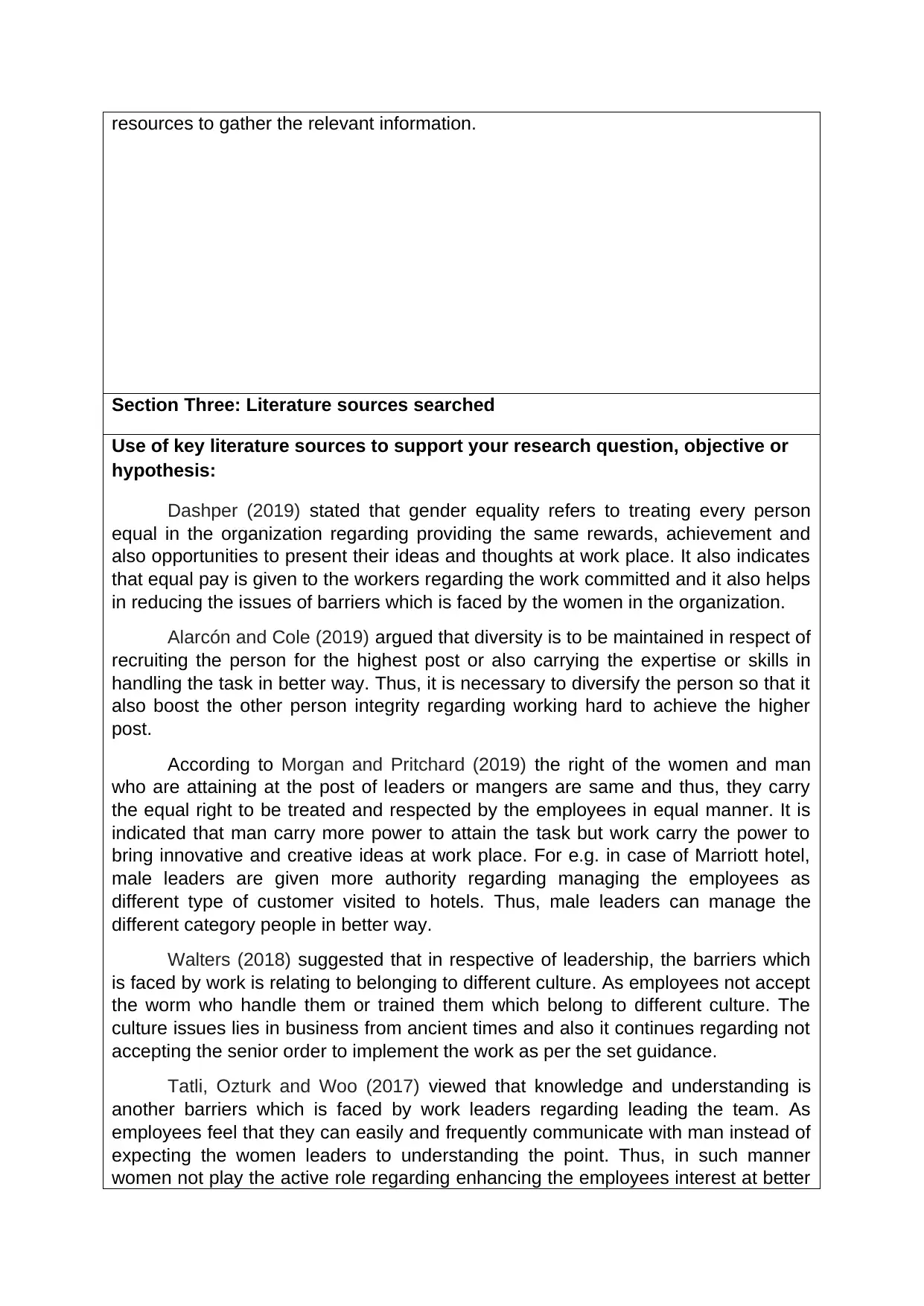
resources to gather the relevant information.
Section Three: Literature sources searched
Use of key literature sources to support your research question, objective or
hypothesis:
Dashper (2019) stated that gender equality refers to treating every person
equal in the organization regarding providing the same rewards, achievement and
also opportunities to present their ideas and thoughts at work place. It also indicates
that equal pay is given to the workers regarding the work committed and it also helps
in reducing the issues of barriers which is faced by the women in the organization.
Alarcón and Cole (2019) argued that diversity is to be maintained in respect of
recruiting the person for the highest post or also carrying the expertise or skills in
handling the task in better way. Thus, it is necessary to diversify the person so that it
also boost the other person integrity regarding working hard to achieve the higher
post.
According to Morgan and Pritchard (2019) the right of the women and man
who are attaining at the post of leaders or mangers are same and thus, they carry
the equal right to be treated and respected by the employees in equal manner. It is
indicated that man carry more power to attain the task but work carry the power to
bring innovative and creative ideas at work place. For e.g. in case of Marriott hotel,
male leaders are given more authority regarding managing the employees as
different type of customer visited to hotels. Thus, male leaders can manage the
different category people in better way.
Walters (2018) suggested that in respective of leadership, the barriers which
is faced by work is relating to belonging to different culture. As employees not accept
the worm who handle them or trained them which belong to different culture. The
culture issues lies in business from ancient times and also it continues regarding not
accepting the senior order to implement the work as per the set guidance.
Tatli, Ozturk and Woo (2017) viewed that knowledge and understanding is
another barriers which is faced by work leaders regarding leading the team. As
employees feel that they can easily and frequently communicate with man instead of
expecting the women leaders to understanding the point. Thus, in such manner
women not play the active role regarding enhancing the employees interest at better
Section Three: Literature sources searched
Use of key literature sources to support your research question, objective or
hypothesis:
Dashper (2019) stated that gender equality refers to treating every person
equal in the organization regarding providing the same rewards, achievement and
also opportunities to present their ideas and thoughts at work place. It also indicates
that equal pay is given to the workers regarding the work committed and it also helps
in reducing the issues of barriers which is faced by the women in the organization.
Alarcón and Cole (2019) argued that diversity is to be maintained in respect of
recruiting the person for the highest post or also carrying the expertise or skills in
handling the task in better way. Thus, it is necessary to diversify the person so that it
also boost the other person integrity regarding working hard to achieve the higher
post.
According to Morgan and Pritchard (2019) the right of the women and man
who are attaining at the post of leaders or mangers are same and thus, they carry
the equal right to be treated and respected by the employees in equal manner. It is
indicated that man carry more power to attain the task but work carry the power to
bring innovative and creative ideas at work place. For e.g. in case of Marriott hotel,
male leaders are given more authority regarding managing the employees as
different type of customer visited to hotels. Thus, male leaders can manage the
different category people in better way.
Walters (2018) suggested that in respective of leadership, the barriers which
is faced by work is relating to belonging to different culture. As employees not accept
the worm who handle them or trained them which belong to different culture. The
culture issues lies in business from ancient times and also it continues regarding not
accepting the senior order to implement the work as per the set guidance.
Tatli, Ozturk and Woo (2017) viewed that knowledge and understanding is
another barriers which is faced by work leaders regarding leading the team. As
employees feel that they can easily and frequently communicate with man instead of
expecting the women leaders to understanding the point. Thus, in such manner
women not play the active role regarding enhancing the employees interest at better
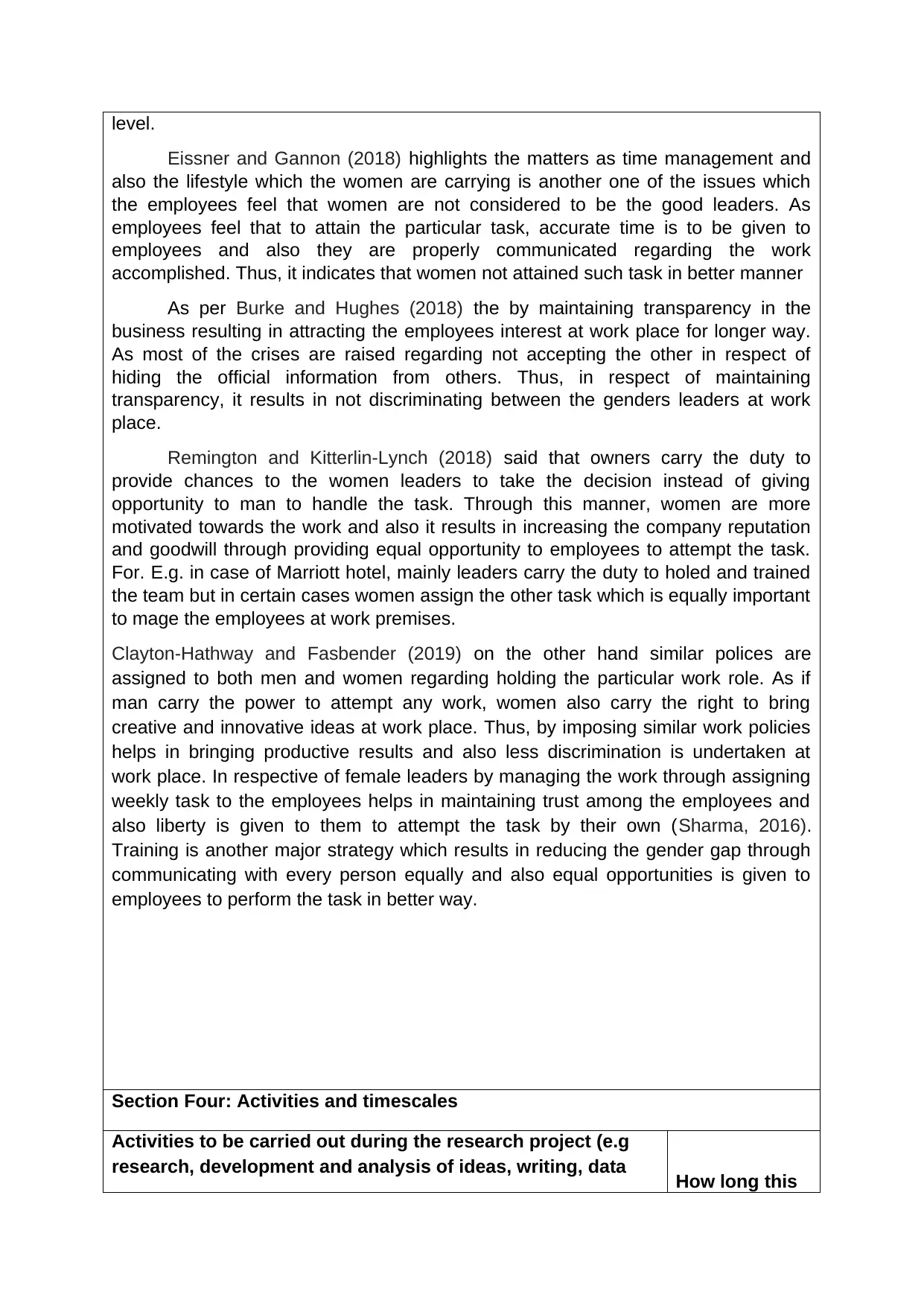
level.
Eissner and Gannon (2018) highlights the matters as time management and
also the lifestyle which the women are carrying is another one of the issues which
the employees feel that women are not considered to be the good leaders. As
employees feel that to attain the particular task, accurate time is to be given to
employees and also they are properly communicated regarding the work
accomplished. Thus, it indicates that women not attained such task in better manner
As per Burke and Hughes (2018) the by maintaining transparency in the
business resulting in attracting the employees interest at work place for longer way.
As most of the crises are raised regarding not accepting the other in respect of
hiding the official information from others. Thus, in respect of maintaining
transparency, it results in not discriminating between the genders leaders at work
place.
Remington and Kitterlin-Lynch (2018) said that owners carry the duty to
provide chances to the women leaders to take the decision instead of giving
opportunity to man to handle the task. Through this manner, women are more
motivated towards the work and also it results in increasing the company reputation
and goodwill through providing equal opportunity to employees to attempt the task.
For. E.g. in case of Marriott hotel, mainly leaders carry the duty to holed and trained
the team but in certain cases women assign the other task which is equally important
to mage the employees at work premises.
Clayton-Hathway and Fasbender (2019) on the other hand similar polices are
assigned to both men and women regarding holding the particular work role. As if
man carry the power to attempt any work, women also carry the right to bring
creative and innovative ideas at work place. Thus, by imposing similar work policies
helps in bringing productive results and also less discrimination is undertaken at
work place. In respective of female leaders by managing the work through assigning
weekly task to the employees helps in maintaining trust among the employees and
also liberty is given to them to attempt the task by their own (Sharma, 2016).
Training is another major strategy which results in reducing the gender gap through
communicating with every person equally and also equal opportunities is given to
employees to perform the task in better way.
Section Four: Activities and timescales
Activities to be carried out during the research project (e.g
research, development and analysis of ideas, writing, data How long this
Eissner and Gannon (2018) highlights the matters as time management and
also the lifestyle which the women are carrying is another one of the issues which
the employees feel that women are not considered to be the good leaders. As
employees feel that to attain the particular task, accurate time is to be given to
employees and also they are properly communicated regarding the work
accomplished. Thus, it indicates that women not attained such task in better manner
As per Burke and Hughes (2018) the by maintaining transparency in the
business resulting in attracting the employees interest at work place for longer way.
As most of the crises are raised regarding not accepting the other in respect of
hiding the official information from others. Thus, in respect of maintaining
transparency, it results in not discriminating between the genders leaders at work
place.
Remington and Kitterlin-Lynch (2018) said that owners carry the duty to
provide chances to the women leaders to take the decision instead of giving
opportunity to man to handle the task. Through this manner, women are more
motivated towards the work and also it results in increasing the company reputation
and goodwill through providing equal opportunity to employees to attempt the task.
For. E.g. in case of Marriott hotel, mainly leaders carry the duty to holed and trained
the team but in certain cases women assign the other task which is equally important
to mage the employees at work premises.
Clayton-Hathway and Fasbender (2019) on the other hand similar polices are
assigned to both men and women regarding holding the particular work role. As if
man carry the power to attempt any work, women also carry the right to bring
creative and innovative ideas at work place. Thus, by imposing similar work policies
helps in bringing productive results and also less discrimination is undertaken at
work place. In respective of female leaders by managing the work through assigning
weekly task to the employees helps in maintaining trust among the employees and
also liberty is given to them to attempt the task by their own (Sharma, 2016).
Training is another major strategy which results in reducing the gender gap through
communicating with every person equally and also equal opportunities is given to
employees to perform the task in better way.
Section Four: Activities and timescales
Activities to be carried out during the research project (e.g
research, development and analysis of ideas, writing, data How long this
⊘ This is a preview!⊘
Do you want full access?
Subscribe today to unlock all pages.

Trusted by 1+ million students worldwide
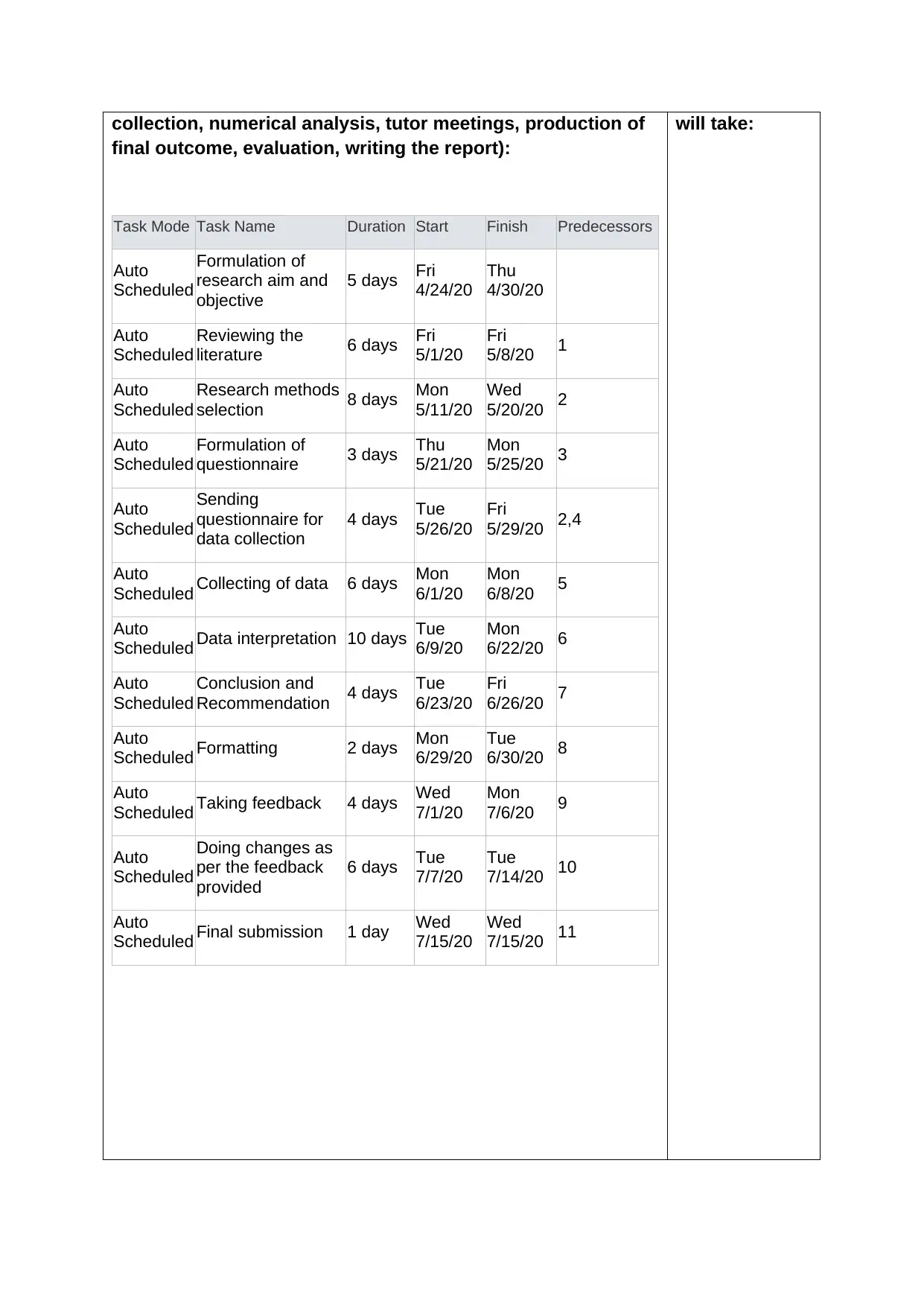
collection, numerical analysis, tutor meetings, production of
final outcome, evaluation, writing the report):
Task Mode Task Name Duration Start Finish Predecessors
Auto
Scheduled
Formulation of
research aim and
objective
5 days Fri
4/24/20
Thu
4/30/20
Auto
Scheduled
Reviewing the
literature 6 days Fri
5/1/20
Fri
5/8/20 1
Auto
Scheduled
Research methods
selection 8 days Mon
5/11/20
Wed
5/20/20 2
Auto
Scheduled
Formulation of
questionnaire 3 days Thu
5/21/20
Mon
5/25/20 3
Auto
Scheduled
Sending
questionnaire for
data collection
4 days Tue
5/26/20
Fri
5/29/20 2,4
Auto
Scheduled Collecting of data 6 days Mon
6/1/20
Mon
6/8/20 5
Auto
Scheduled Data interpretation 10 days Tue
6/9/20
Mon
6/22/20 6
Auto
Scheduled
Conclusion and
Recommendation 4 days Tue
6/23/20
Fri
6/26/20 7
Auto
Scheduled Formatting 2 days Mon
6/29/20
Tue
6/30/20 8
Auto
Scheduled Taking feedback 4 days Wed
7/1/20
Mon
7/6/20 9
Auto
Scheduled
Doing changes as
per the feedback
provided
6 days Tue
7/7/20
Tue
7/14/20 10
Auto
Scheduled Final submission 1 day Wed
7/15/20
Wed
7/15/20 11
will take:
final outcome, evaluation, writing the report):
Task Mode Task Name Duration Start Finish Predecessors
Auto
Scheduled
Formulation of
research aim and
objective
5 days Fri
4/24/20
Thu
4/30/20
Auto
Scheduled
Reviewing the
literature 6 days Fri
5/1/20
Fri
5/8/20 1
Auto
Scheduled
Research methods
selection 8 days Mon
5/11/20
Wed
5/20/20 2
Auto
Scheduled
Formulation of
questionnaire 3 days Thu
5/21/20
Mon
5/25/20 3
Auto
Scheduled
Sending
questionnaire for
data collection
4 days Tue
5/26/20
Fri
5/29/20 2,4
Auto
Scheduled Collecting of data 6 days Mon
6/1/20
Mon
6/8/20 5
Auto
Scheduled Data interpretation 10 days Tue
6/9/20
Mon
6/22/20 6
Auto
Scheduled
Conclusion and
Recommendation 4 days Tue
6/23/20
Fri
6/26/20 7
Auto
Scheduled Formatting 2 days Mon
6/29/20
Tue
6/30/20 8
Auto
Scheduled Taking feedback 4 days Wed
7/1/20
Mon
7/6/20 9
Auto
Scheduled
Doing changes as
per the feedback
provided
6 days Tue
7/7/20
Tue
7/14/20 10
Auto
Scheduled Final submission 1 day Wed
7/15/20
Wed
7/15/20 11
will take:
Paraphrase This Document
Need a fresh take? Get an instant paraphrase of this document with our AI Paraphraser
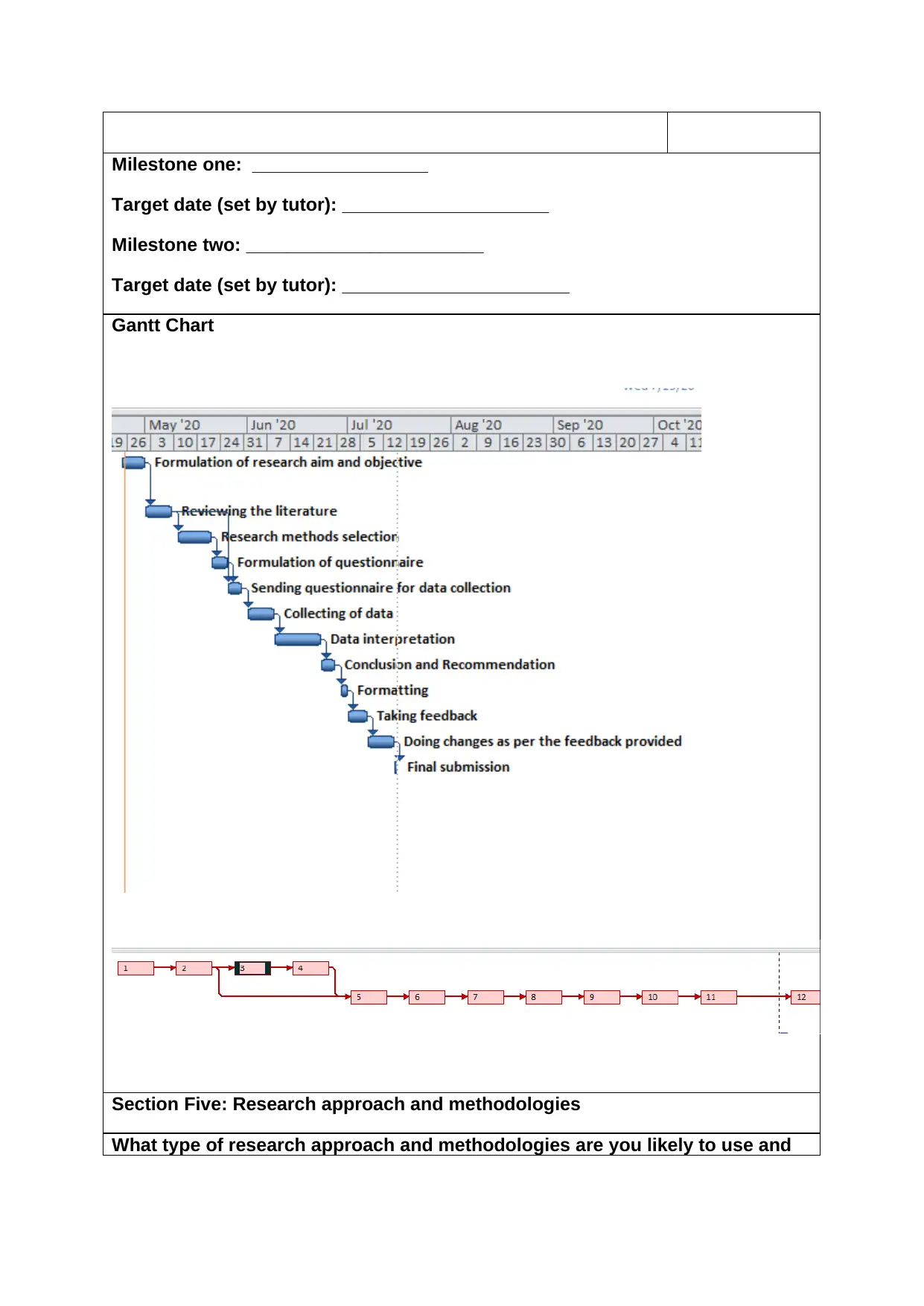
Milestone one: _________________
Target date (set by tutor): ____________________
Milestone two: _______________________
Target date (set by tutor): ______________________
Gantt Chart
Section Five: Research approach and methodologies
What type of research approach and methodologies are you likely to use and
Target date (set by tutor): ____________________
Milestone two: _______________________
Target date (set by tutor): ______________________
Gantt Chart
Section Five: Research approach and methodologies
What type of research approach and methodologies are you likely to use and
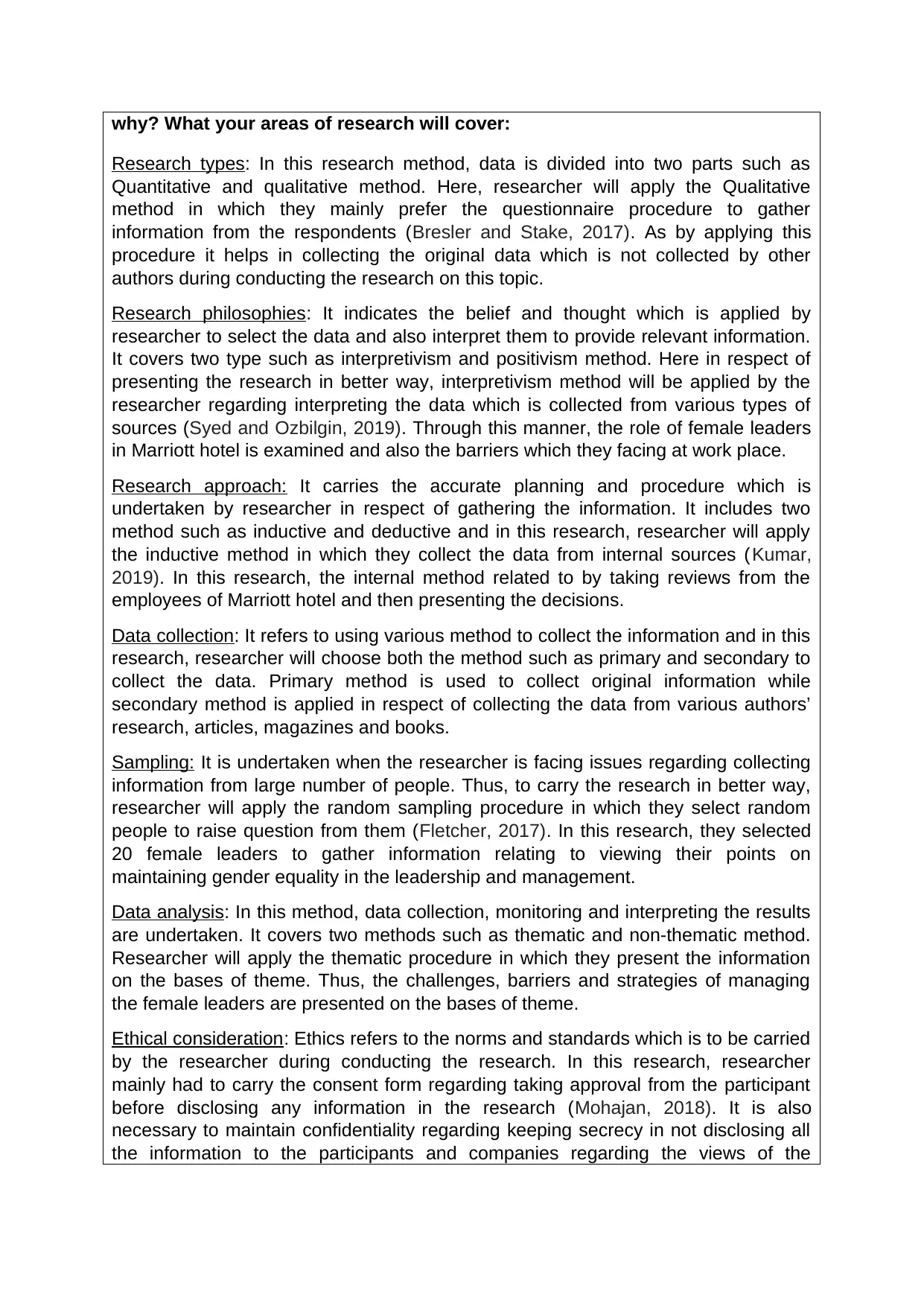
why? What your areas of research will cover:
Research types: In this research method, data is divided into two parts such as
Quantitative and qualitative method. Here, researcher will apply the Qualitative
method in which they mainly prefer the questionnaire procedure to gather
information from the respondents (Bresler and Stake, 2017). As by applying this
procedure it helps in collecting the original data which is not collected by other
authors during conducting the research on this topic.
Research philosophies: It indicates the belief and thought which is applied by
researcher to select the data and also interpret them to provide relevant information.
It covers two type such as interpretivism and positivism method. Here in respect of
presenting the research in better way, interpretivism method will be applied by the
researcher regarding interpreting the data which is collected from various types of
sources (Syed and Ozbilgin, 2019). Through this manner, the role of female leaders
in Marriott hotel is examined and also the barriers which they facing at work place.
Research approach: It carries the accurate planning and procedure which is
undertaken by researcher in respect of gathering the information. It includes two
method such as inductive and deductive and in this research, researcher will apply
the inductive method in which they collect the data from internal sources (Kumar,
2019). In this research, the internal method related to by taking reviews from the
employees of Marriott hotel and then presenting the decisions.
Data collection: It refers to using various method to collect the information and in this
research, researcher will choose both the method such as primary and secondary to
collect the data. Primary method is used to collect original information while
secondary method is applied in respect of collecting the data from various authors’
research, articles, magazines and books.
Sampling: It is undertaken when the researcher is facing issues regarding collecting
information from large number of people. Thus, to carry the research in better way,
researcher will apply the random sampling procedure in which they select random
people to raise question from them (Fletcher, 2017). In this research, they selected
20 female leaders to gather information relating to viewing their points on
maintaining gender equality in the leadership and management.
Data analysis: In this method, data collection, monitoring and interpreting the results
are undertaken. It covers two methods such as thematic and non-thematic method.
Researcher will apply the thematic procedure in which they present the information
on the bases of theme. Thus, the challenges, barriers and strategies of managing
the female leaders are presented on the bases of theme.
Ethical consideration: Ethics refers to the norms and standards which is to be carried
by the researcher during conducting the research. In this research, researcher
mainly had to carry the consent form regarding taking approval from the participant
before disclosing any information in the research (Mohajan, 2018). It is also
necessary to maintain confidentiality regarding keeping secrecy in not disclosing all
the information to the participants and companies regarding the views of the
Research types: In this research method, data is divided into two parts such as
Quantitative and qualitative method. Here, researcher will apply the Qualitative
method in which they mainly prefer the questionnaire procedure to gather
information from the respondents (Bresler and Stake, 2017). As by applying this
procedure it helps in collecting the original data which is not collected by other
authors during conducting the research on this topic.
Research philosophies: It indicates the belief and thought which is applied by
researcher to select the data and also interpret them to provide relevant information.
It covers two type such as interpretivism and positivism method. Here in respect of
presenting the research in better way, interpretivism method will be applied by the
researcher regarding interpreting the data which is collected from various types of
sources (Syed and Ozbilgin, 2019). Through this manner, the role of female leaders
in Marriott hotel is examined and also the barriers which they facing at work place.
Research approach: It carries the accurate planning and procedure which is
undertaken by researcher in respect of gathering the information. It includes two
method such as inductive and deductive and in this research, researcher will apply
the inductive method in which they collect the data from internal sources (Kumar,
2019). In this research, the internal method related to by taking reviews from the
employees of Marriott hotel and then presenting the decisions.
Data collection: It refers to using various method to collect the information and in this
research, researcher will choose both the method such as primary and secondary to
collect the data. Primary method is used to collect original information while
secondary method is applied in respect of collecting the data from various authors’
research, articles, magazines and books.
Sampling: It is undertaken when the researcher is facing issues regarding collecting
information from large number of people. Thus, to carry the research in better way,
researcher will apply the random sampling procedure in which they select random
people to raise question from them (Fletcher, 2017). In this research, they selected
20 female leaders to gather information relating to viewing their points on
maintaining gender equality in the leadership and management.
Data analysis: In this method, data collection, monitoring and interpreting the results
are undertaken. It covers two methods such as thematic and non-thematic method.
Researcher will apply the thematic procedure in which they present the information
on the bases of theme. Thus, the challenges, barriers and strategies of managing
the female leaders are presented on the bases of theme.
Ethical consideration: Ethics refers to the norms and standards which is to be carried
by the researcher during conducting the research. In this research, researcher
mainly had to carry the consent form regarding taking approval from the participant
before disclosing any information in the research (Mohajan, 2018). It is also
necessary to maintain confidentiality regarding keeping secrecy in not disclosing all
the information to the participants and companies regarding the views of the
⊘ This is a preview!⊘
Do you want full access?
Subscribe today to unlock all pages.

Trusted by 1+ million students worldwide
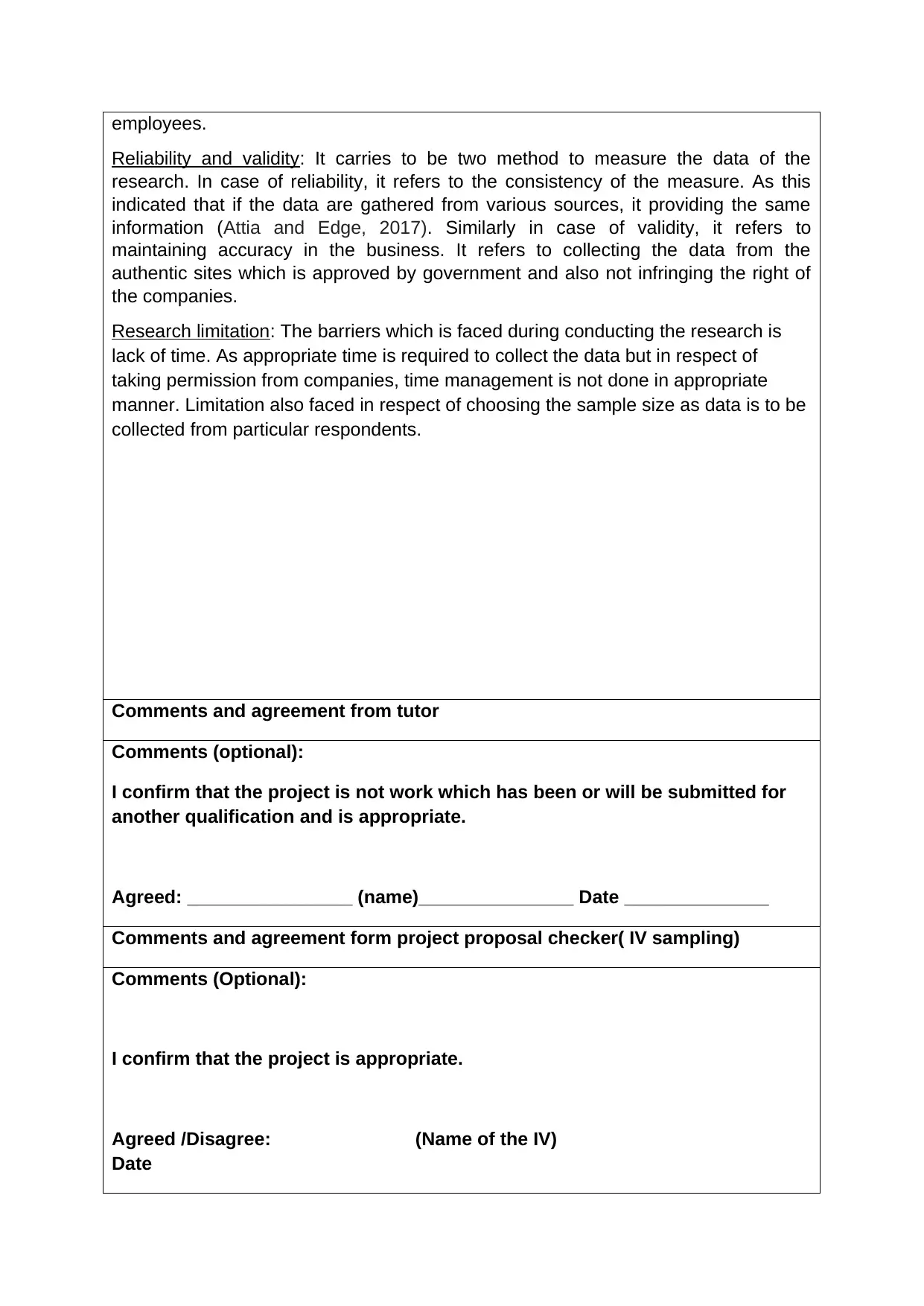
employees.
Reliability and validity: It carries to be two method to measure the data of the
research. In case of reliability, it refers to the consistency of the measure. As this
indicated that if the data are gathered from various sources, it providing the same
information (Attia and Edge, 2017). Similarly in case of validity, it refers to
maintaining accuracy in the business. It refers to collecting the data from the
authentic sites which is approved by government and also not infringing the right of
the companies.
Research limitation: The barriers which is faced during conducting the research is
lack of time. As appropriate time is required to collect the data but in respect of
taking permission from companies, time management is not done in appropriate
manner. Limitation also faced in respect of choosing the sample size as data is to be
collected from particular respondents.
Comments and agreement from tutor
Comments (optional):
I confirm that the project is not work which has been or will be submitted for
another qualification and is appropriate.
Agreed: ________________ (name)_______________ Date ______________
Comments and agreement form project proposal checker( IV sampling)
Comments (Optional):
I confirm that the project is appropriate.
Agreed /Disagree: (Name of the IV)
Date
Reliability and validity: It carries to be two method to measure the data of the
research. In case of reliability, it refers to the consistency of the measure. As this
indicated that if the data are gathered from various sources, it providing the same
information (Attia and Edge, 2017). Similarly in case of validity, it refers to
maintaining accuracy in the business. It refers to collecting the data from the
authentic sites which is approved by government and also not infringing the right of
the companies.
Research limitation: The barriers which is faced during conducting the research is
lack of time. As appropriate time is required to collect the data but in respect of
taking permission from companies, time management is not done in appropriate
manner. Limitation also faced in respect of choosing the sample size as data is to be
collected from particular respondents.
Comments and agreement from tutor
Comments (optional):
I confirm that the project is not work which has been or will be submitted for
another qualification and is appropriate.
Agreed: ________________ (name)_______________ Date ______________
Comments and agreement form project proposal checker( IV sampling)
Comments (Optional):
I confirm that the project is appropriate.
Agreed /Disagree: (Name of the IV)
Date
Paraphrase This Document
Need a fresh take? Get an instant paraphrase of this document with our AI Paraphraser

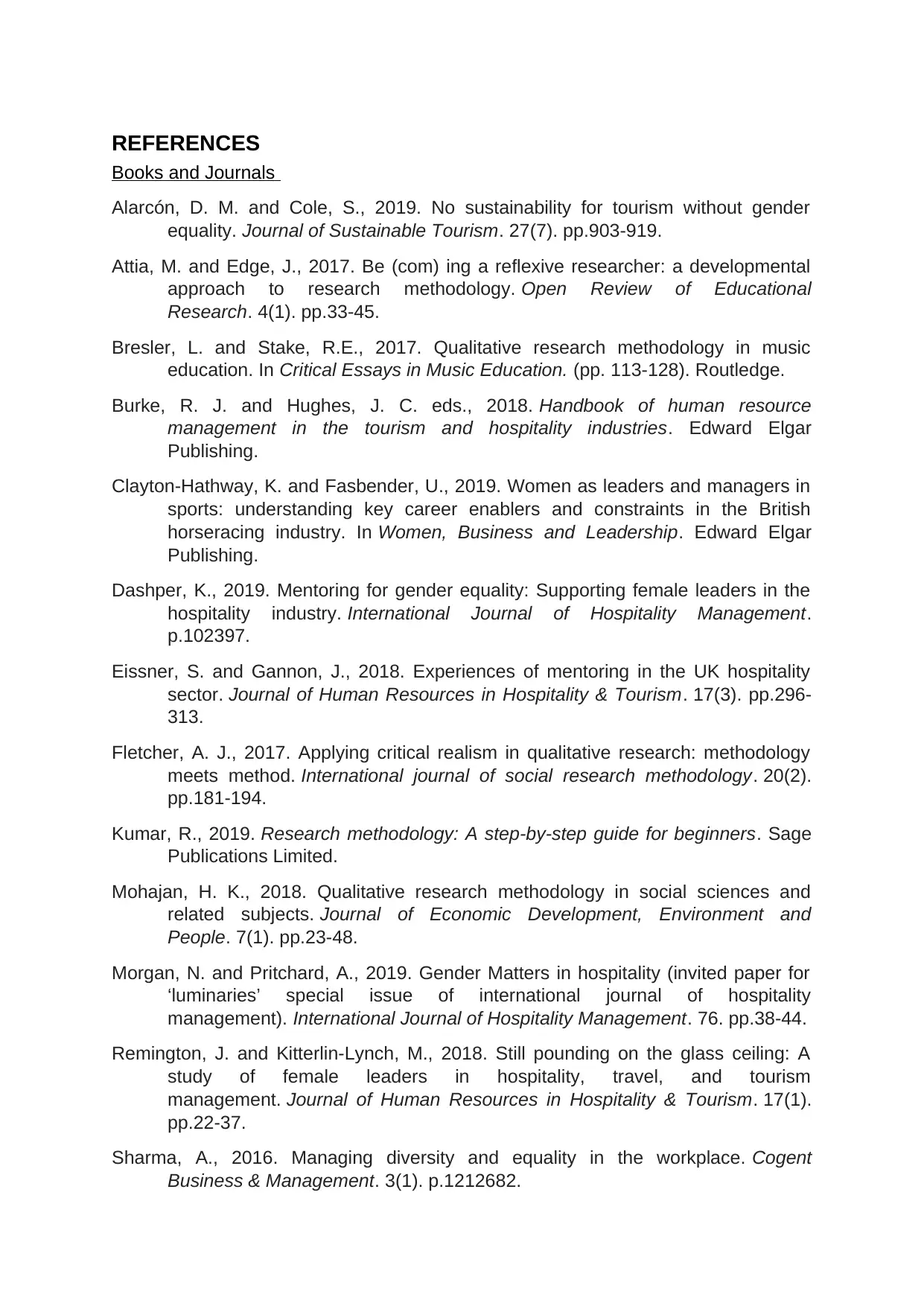
REFERENCES
Books and Journals
Alarcón, D. M. and Cole, S., 2019. No sustainability for tourism without gender
equality. Journal of Sustainable Tourism. 27(7). pp.903-919.
Attia, M. and Edge, J., 2017. Be (com) ing a reflexive researcher: a developmental
approach to research methodology. Open Review of Educational
Research. 4(1). pp.33-45.
Bresler, L. and Stake, R.E., 2017. Qualitative research methodology in music
education. In Critical Essays in Music Education. (pp. 113-128). Routledge.
Burke, R. J. and Hughes, J. C. eds., 2018. Handbook of human resource
management in the tourism and hospitality industries. Edward Elgar
Publishing.
Clayton-Hathway, K. and Fasbender, U., 2019. Women as leaders and managers in
sports: understanding key career enablers and constraints in the British
horseracing industry. In Women, Business and Leadership. Edward Elgar
Publishing.
Dashper, K., 2019. Mentoring for gender equality: Supporting female leaders in the
hospitality industry. International Journal of Hospitality Management.
p.102397.
Eissner, S. and Gannon, J., 2018. Experiences of mentoring in the UK hospitality
sector. Journal of Human Resources in Hospitality & Tourism. 17(3). pp.296-
313.
Fletcher, A. J., 2017. Applying critical realism in qualitative research: methodology
meets method. International journal of social research methodology. 20(2).
pp.181-194.
Kumar, R., 2019. Research methodology: A step-by-step guide for beginners. Sage
Publications Limited.
Mohajan, H. K., 2018. Qualitative research methodology in social sciences and
related subjects. Journal of Economic Development, Environment and
People. 7(1). pp.23-48.
Morgan, N. and Pritchard, A., 2019. Gender Matters in hospitality (invited paper for
‘luminaries’ special issue of international journal of hospitality
management). International Journal of Hospitality Management. 76. pp.38-44.
Remington, J. and Kitterlin-Lynch, M., 2018. Still pounding on the glass ceiling: A
study of female leaders in hospitality, travel, and tourism
management. Journal of Human Resources in Hospitality & Tourism. 17(1).
pp.22-37.
Sharma, A., 2016. Managing diversity and equality in the workplace. Cogent
Business & Management. 3(1). p.1212682.
Books and Journals
Alarcón, D. M. and Cole, S., 2019. No sustainability for tourism without gender
equality. Journal of Sustainable Tourism. 27(7). pp.903-919.
Attia, M. and Edge, J., 2017. Be (com) ing a reflexive researcher: a developmental
approach to research methodology. Open Review of Educational
Research. 4(1). pp.33-45.
Bresler, L. and Stake, R.E., 2017. Qualitative research methodology in music
education. In Critical Essays in Music Education. (pp. 113-128). Routledge.
Burke, R. J. and Hughes, J. C. eds., 2018. Handbook of human resource
management in the tourism and hospitality industries. Edward Elgar
Publishing.
Clayton-Hathway, K. and Fasbender, U., 2019. Women as leaders and managers in
sports: understanding key career enablers and constraints in the British
horseracing industry. In Women, Business and Leadership. Edward Elgar
Publishing.
Dashper, K., 2019. Mentoring for gender equality: Supporting female leaders in the
hospitality industry. International Journal of Hospitality Management.
p.102397.
Eissner, S. and Gannon, J., 2018. Experiences of mentoring in the UK hospitality
sector. Journal of Human Resources in Hospitality & Tourism. 17(3). pp.296-
313.
Fletcher, A. J., 2017. Applying critical realism in qualitative research: methodology
meets method. International journal of social research methodology. 20(2).
pp.181-194.
Kumar, R., 2019. Research methodology: A step-by-step guide for beginners. Sage
Publications Limited.
Mohajan, H. K., 2018. Qualitative research methodology in social sciences and
related subjects. Journal of Economic Development, Environment and
People. 7(1). pp.23-48.
Morgan, N. and Pritchard, A., 2019. Gender Matters in hospitality (invited paper for
‘luminaries’ special issue of international journal of hospitality
management). International Journal of Hospitality Management. 76. pp.38-44.
Remington, J. and Kitterlin-Lynch, M., 2018. Still pounding on the glass ceiling: A
study of female leaders in hospitality, travel, and tourism
management. Journal of Human Resources in Hospitality & Tourism. 17(1).
pp.22-37.
Sharma, A., 2016. Managing diversity and equality in the workplace. Cogent
Business & Management. 3(1). p.1212682.
⊘ This is a preview!⊘
Do you want full access?
Subscribe today to unlock all pages.

Trusted by 1+ million students worldwide
1 out of 15
Related Documents
Your All-in-One AI-Powered Toolkit for Academic Success.
+13062052269
info@desklib.com
Available 24*7 on WhatsApp / Email
![[object Object]](/_next/static/media/star-bottom.7253800d.svg)
Unlock your academic potential
Copyright © 2020–2026 A2Z Services. All Rights Reserved. Developed and managed by ZUCOL.





